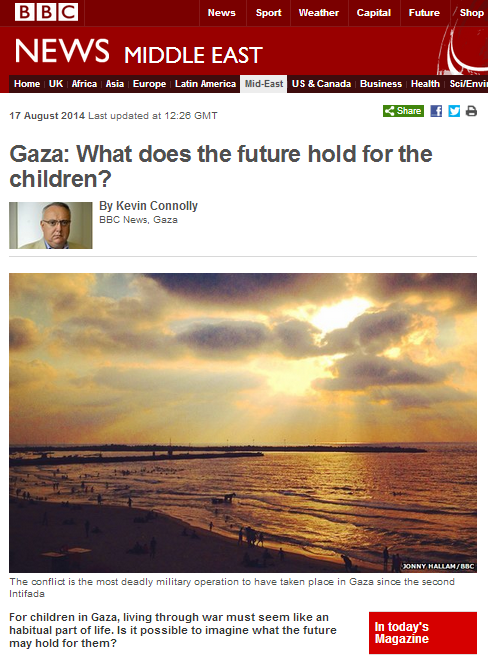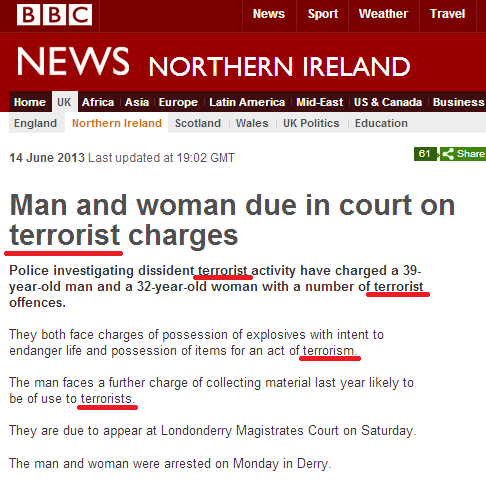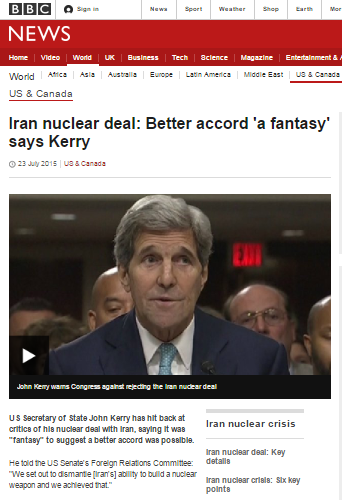The BBC Radio 4 version of ‘From Our Own Correspondent’ featured an item by the Jerusalem Bureau’s Kevin Connolly in its August 16th edition which can be heard from around 06:56 here or as a podcast here. A very similar written version of Connolly’s report appeared in the ‘Features & Analysis’ section of the BBC News website’s Middle East page on August 17th under the title “Gaza: What does the future hold for the children?“.
Kevin Connolly is currently located in the Gaza Strip and, as the title of his report suggests, his last few days there seem to have understandably prompted him to worry about the children living in that territory.
“For children in Gaza, living through war must seem like an habitual part of life. Is it possible to imagine what the future may hold for them? […]
The children fizz with energy and curiosity, singing out their names across the gap between the buildings and demanding to know ours.
They quickly learn to wait until we are on air using the balcony’s portable satellite dish, before shouting across. They know that our desperate requests for quiet then have to be mimed, much to their amusement.
I find myself worrying what the future holds for them. […]
If you are a six-year-old in Gaza, you have already lived through three separate wars – the ugly and brutal confrontations with Israel which flared in 2008, 2012 and again this year. It is as though Gaza is a kind of junction box where the dysfunctional neural wiring of the Middle East fused a long time ago.”
Of course if you are a six year-old less than a mile away in Sderot you have also lived through those same three wars and if you are a thirteen year-old from any of the towns and villages surrounding the Gaza Strip, you have never known life without the constant missile fire from the Gaza Strip which – whenever the terrorist organisations there choose to escalate it – is the cause for the “brutal confrontations” which Kevin Connolly ambiguously describes as having “flared” without explaining why that is the case.
Interestingly though, since Connolly arrived in the BBC’s Jerusalem Bureau in June 2010, neither he nor any of his colleagues have been sufficiently worried about the children in Sderot to make the 90 minute drive down there and ponder their future. The last BBC correspondents to do anything of that sort were Nick Thorpe in 2006 and Tim Franks in 2008. Perhaps some insight into Kevin Connolly’s comprehension of the situation can be gleaned from this segment of his report:
“And yet, decisive victory seems to elude Israel, just as it eludes Hamas. The fighting will probably end in ways which are ambiguous and unsatisfactory, just as it has in the past.
That will be tough on the civilians of southern Israel, who will almost certainly find themselves running for their air-raid shelters again in future.
But it will be tougher still for those children on the roof next door. They have no air-raid shelters and very little chance of escaping to the wider world as long as Israel and Egypt maintain strict controls on all movement across Gaza’s borders.”
Connolly makes no effort to inform his listeners or readers that the reason Israeli children have air–raid shelters is because their country invests considerable resources in the protection of its citizens and the reason the children in Gaza do not have air-raid shelters is that Hamas invests considerable resources in acquiring missiles and using concrete to build cross-border attack tunnels rather than air-raid shelters. Like the rest of his colleagues he of course refrains from mentioning that those controls on Gaza’s borders with Israel are necessary precisely because of those Hamas policies.
So whilst Connolly tugs at listeners’ heart strings with his artistic descriptions of Gaza and its young residents, he manipulatively blocks any mention of the root cause of the picture he paints from audience view.
He also returns to the BBC practice of trivialising terror attacks against Israeli civilians by promoting the jaded ‘homemade rockets’ theme.
“These confrontations are hopelessly asymmetrical. Many of Hamas’s rockets are out-of-date or home-made, compared with Israel’s powerful and sophisticated weapons.”
Likewise, Connolly fails to convey to listeners and readers the fact that it was Egypt’s belligerency which eventually resulted in the Gaza Strip coming under Israeli control in 1967, that Israel withdrew from that territory nine years ago and that Israel controls the coastal waters and air-space of the Gaza Strip because the representatives of the Palestinian people – the PA – signed agreements stipulating those conditions two decades ago.
“In the Six Day War of 1967 Israel came back and has occupied Gaza – or controlled life inside it – ever since.”
Obviously, if Connolly’s statement were accurate and Israel did control life inside the Gaza Strip, there would not have been thousands of missiles fired at Israeli civilians from that territory or cross-border attack tunnels dug over the years. Connolly is no less inaccurate when he tells audiences:
“At one point, Hamas appeared to be navigating the treacherous cross-currents of the Arab Spring effortlessly. It seemed able to count, at different points, on the support of Syria, Egypt and Iran – all powerful regional players.
Now, through a combination of misjudgement and misfortune, it can count on none of them.”
The great misfortune of the children of the Gaza Strip is of course that the place they live is under the control of a nihilistic terrorist organization which puts their welfare way down its list of priorities and the terrorisation and murder of Israeli children at the top. Had Kevin Connolly bothered to properly explain that crucial point to BBC audiences instead of making do with flowery clichés and trite descriptions of sunsets, he might actually have made a step towards doing what the BBC exists to do: informing its funding public not just what is going on in the world, but why.




